SEO for Dentists: A Quick 6-Step Guide
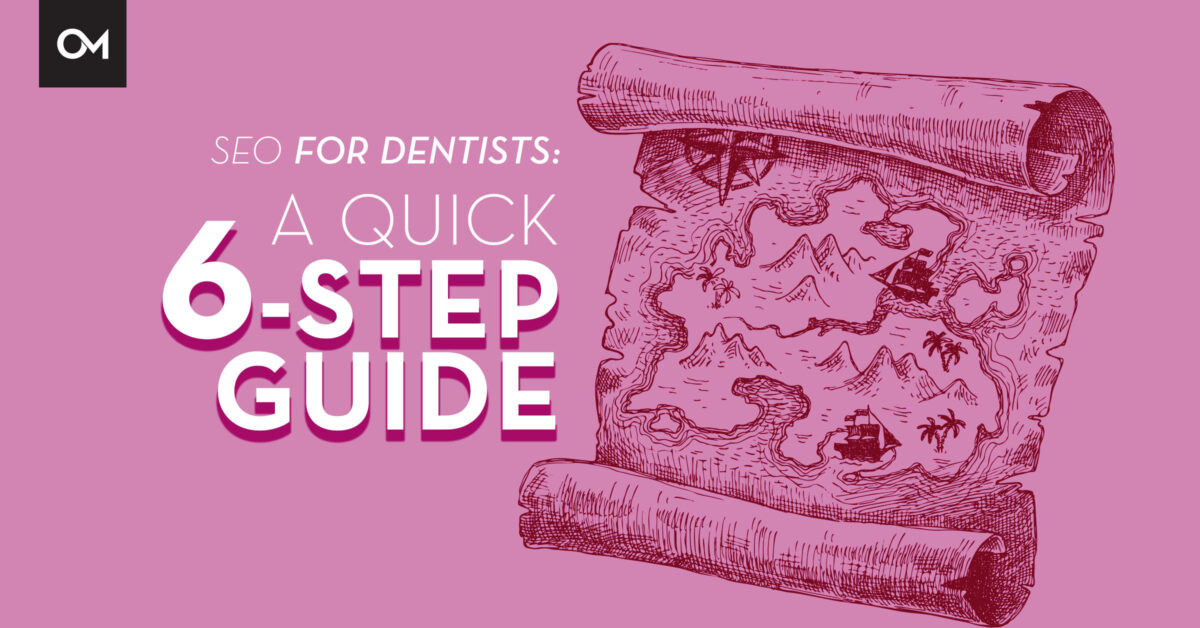
To grow your dental practice, you should consider investing in a search engine optimization (SEO) strategy. SEO is an aspect of dental marketing that seems complex, but it’s not if you understand how it works. However, there are a lot of good resources and bad resources, so it’s important to sort through what’s going to make the most out of your marketing dollars.
If you already know the basics of SEO, jump down to how to rank on Google.
What Is SEO and How Does It Work?
SEO stands for Search Engine Optimization and it’s the strategy behind optimizing your website and online presence to make your website show up on a search engine results page (SERP).
While SEO experts might have ideas on how to improve rankings, actual results are never guaranteed, as the reasons Google chooses to rank practices the way it does is influenced by a large number of variables.
A good SEO expert will constantly make small changes to your website and will research and be aware of Google algorithm changes to follow ever-changing best practices. When thinking about how to do SEO, there are a number of pieces you have to consider:
- How fast is your website?
- Can Google crawl your website?
- Is your website easy to use?
- Is the content on your website unique, helpful, and authoritative?
- Is the content on your website relevant to your audience and your industry?
- Is your Google My Business profile optimized?
- Do you have schema markup on your website to make it easier for Google to read?
- Do reputable websites link to your website?
Before you even start wondering what your ranking is on search engines, you have to make sure your website can be found by Google in the first place. Some potential actions you can take include uploading a sitemap in Google Search Console, and making sure your content is unique, not copied from somewhere else. Also, remove any restrictions on the site itself to prevent Google’s bots from reading the content on your site.

You can also increase the potential for better rankings by finding opportunities to get your site linked back to by relevant sites. For example, if your website is listed on the American Dental Association’s website, that can help your chances to rank as your website looks more authoritative in Google’s algorithm.
What Is Dental SEO?
Dental SEO is the same concept as SEO, with a heavy emphasis on local rankings. It’s about ranking within the city you’re in or within a certain mile radius around your practice. It’s also about focusing on building your practice’s reputation online to improve your rankings on Google and other search engines. While each industry might have a few different techniques to implement good SEO, the goals are the same:
Find ways to increase the rankings of your site on Google.
Do Dentists Need SEO?
If you want your practice to grow, you should consider investing time and money to build an SEO strategy. While many dentists were able to get by on word-of-mouth, it’s becoming more and important to invest time and money into your marketing strategy and get a website and be found on Google. According to BrightLocal, 93% of US consumers searched online to find a local business. This includes looking for dentists, too!
Can You Do SEO on Your Own?
You can do SEO on your own, but you can run into a lot of pitfalls. There are many good resources to help you learn SEO, like Moz’s beginner’s guide to SEO. However, becoming an SEO expert takes time and experience to help you make the most out of your time and money to build a strategy that works.
For example, your dental practice might not need an online store. You also might not need to post regularly on social media platforms like Twitter. Working with a dental marketing agency to build your SEO strategy can make a big difference and be well worth the investment.
If you want to take control of your marketing and story online, invest in our do-it-yourself dental marketing package. We’ve compiled an entire library of SEO resources and more to help you do SEO on your own.
How To Rank on Google
There is no guaranteed way to rank well on Google, but there are steps you can take to increase your chances. To understand how to rank high on Google, you have to understand what Google looks for when ranking a business:
- Relevance
- Distance
- Prominence
Is the person searching for a dentist currently? How close is your practice to the person searching? How popular or big is your practice’s brand? Would people recommend you or know your name if they heard it? That’s SEO at its core.
The reason why rankings are never guaranteed is because each search is going to bring up slightly different results. While you may show up in the top spot on one device, someone just down the road might see you listed as number four.
Even results between cities just miles apart can be drastically different, because Google is focused on providing the most relevant, local search results. Think of it this way, when someone is talking about Utah, they might say they live in Salt Lake City even though they live in Millcreek. But someone local would know where Millcreek is, and Google does too.
Google wants to provide results as specific as possible based on the location someone is actually in. So, someone searching for businesses while living in Millcreek will get results for businesses in Millcreek, even though Salt Lake City may have more options.
You can see this change in search results for a dentist in Sandy, UT or Draper, UT, two cities only miles apart from each other:
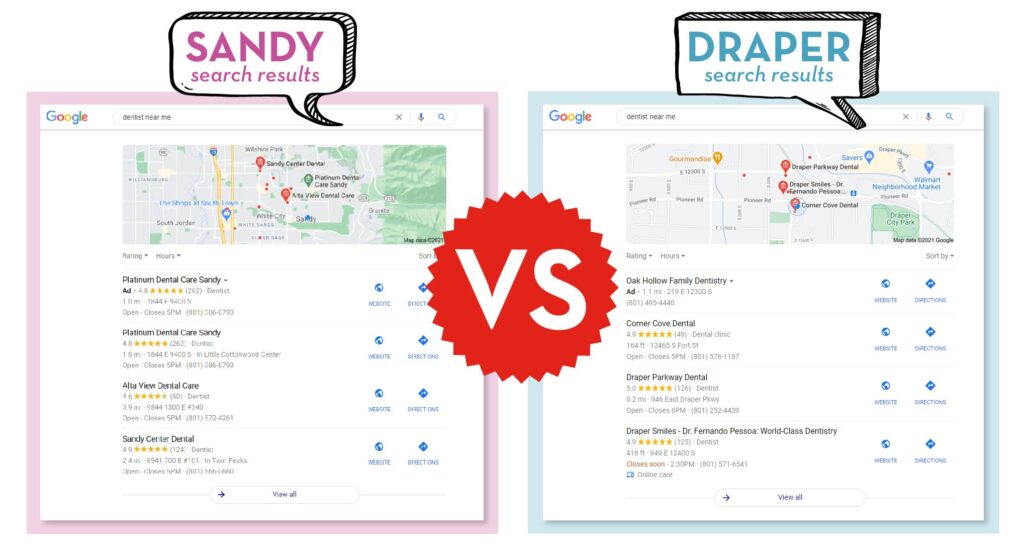
Instead of focusing on getting the top spot, you should focus on optimizing the things you can to make it easier for Google to find and put you in a top three spot. Here are six steps you can take now to build a stronger SEO strategy.
1. Get a Good, Mobile-Optimized Website
If you want to rank on Google, you need a website that is designed to rank on Google. While you can’t guarantee a high spot on Google, there are actions you can take. First, get a good website! A good website is one that:
- Is optimized for mobile
- Loads quickly
- Provides opportunities for people to interact or fill out a form
- Is easy to use and navigate
Think of your website as an office staff member that works to inform and educate your potential patients 24/7. Even if you aren’t readily available, your website should have good content that answers questions your patients have, plus that content should be easy to read.
Not sure if your new website is doing as well as it should? Watch our webinar on 15 SEO problems with your new website and download our free checklist!
If you need help with your website, reach out to our team. You can get one of our proven layouts as part of our dental marketing package to set your website up for success.
2. Optimize Your Google My Business Profile (GMB)
Your Google My Business profile is the panel that shows up when you search for your practice on a Google search. It’s possible to have your practice show up on a Google search, even if you don’t have a website, and that’s through GMB.
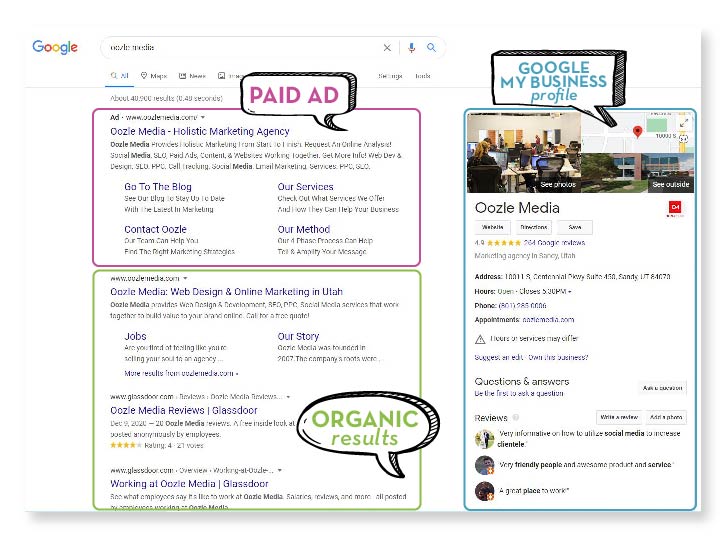
According to SEO professionals and compiled by Whitespark, there are 10 primary ranking factors:
- Your primary GMB category
- Keywords in the GMB business name
- How close your physical location is to the person making the search
- Your physical address vs. city searched for
- Additional GMB categories
- Links to your website
- Keywords in Google reviews
- High numerical Google review ratings
- Removal of spam listings
- Completeness of GMB listing
You don’t have direct control over all of these factors, but there are steps you can take to make it as easy as possible for someone to reach out to your practice.
3. Do Keyword Research
While writing keyword-stuffed content is a thing of SEO’s past, it’s still important to do your keyword research to know what to write about.
Keywords in SEO refers to the terms that people are actively searching to get more information on a topic, choosing a dental practice, and even how to get to the dental practice. You should use tools like Moz’s keyword explorer to figure out what terms people are actually searching for.
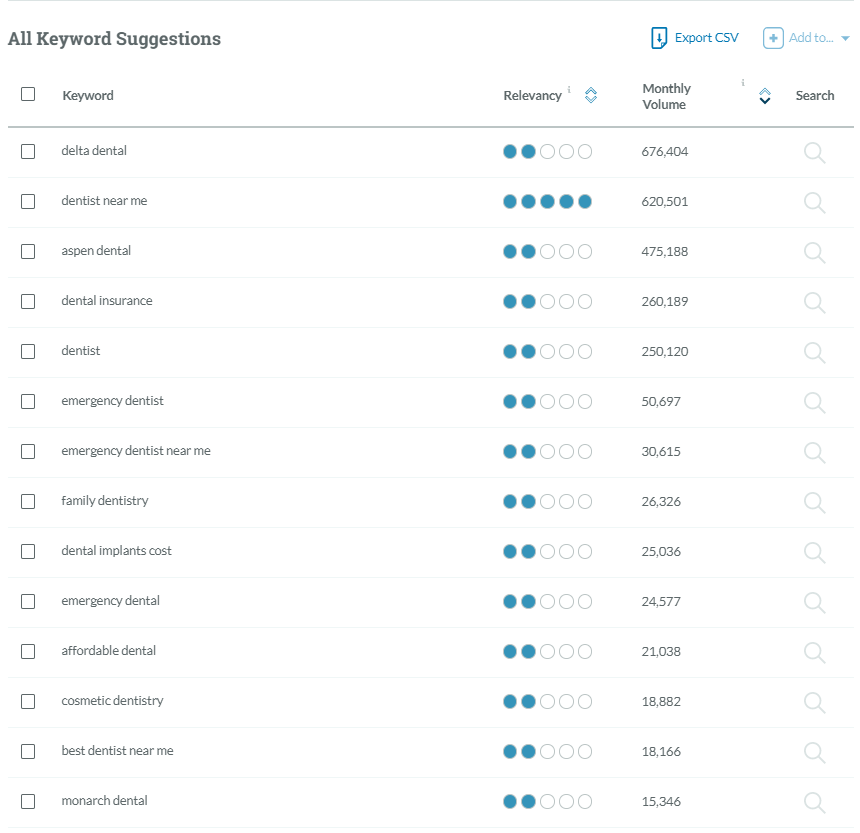
For example, more people might be looking for a “family dentist” than a “general dentist” even though both types of dentists are relatively the same. Finding those terms and using them on your website lets Google and your site visitors know they’ve found the right place.


You can use the keywords you’ve found and make sure they’re reflected in your title and meta description. These are the phrases that show up on a Google search results page.

Make it clear in as few characters as possible what someone should expect. While Google chooses what to show in their search results, you can do your best to optimize this through creating a custom title and meta description that entices people to click on your website, not your competitors.
4. Build a Content Strategy
At Oozle we strongly believe that 90% of SEO is actually based on good content on your website. This means you should regularly be creating and promoting good content on your website. A good content strategy includes:
- Your website copy
- Blogs
- Posts on social media
- And more
Anything you write should have the purpose of informing, entertaining, or helping your potential patients to learn about you and your industry. Using the keyword research from above, think about the types of content your audience would want to read before reaching out to your practice.
Then, start writing them! Answer questions like:
- What do I need to bring into my appointment?
- What insurance do you accept?
- What should I do if my teeth hurt?
- How do I brush my teeth?
- Do you offer emergency services?
These are all potential pieces someone could read before reaching out to your practice! Your website should act as an office manager for your business, so make sure it has the tools it needs to actually get you new patients.
Once you start writing, make sure to promote your content! Create videos, Instagram stories, and more to increase the chances for someone to find your practice.
Read More: Content Marketing for Dentists: How To Build a Great Content Marketing Plan
5. Invest in Pay-Per-Click (PPC) Ads
While you can’t guarantee a spot on the top of the page without paying money, you can spend money on PPC ads to make sure your practice shows up at the top of the page. PPC is a great catch-all to get patients from those who are ready to call the next dentist they see.
You can pay Google to show up at the top of a search results page, and with the right targeting, be the first and last click for someone looking for a dentist.
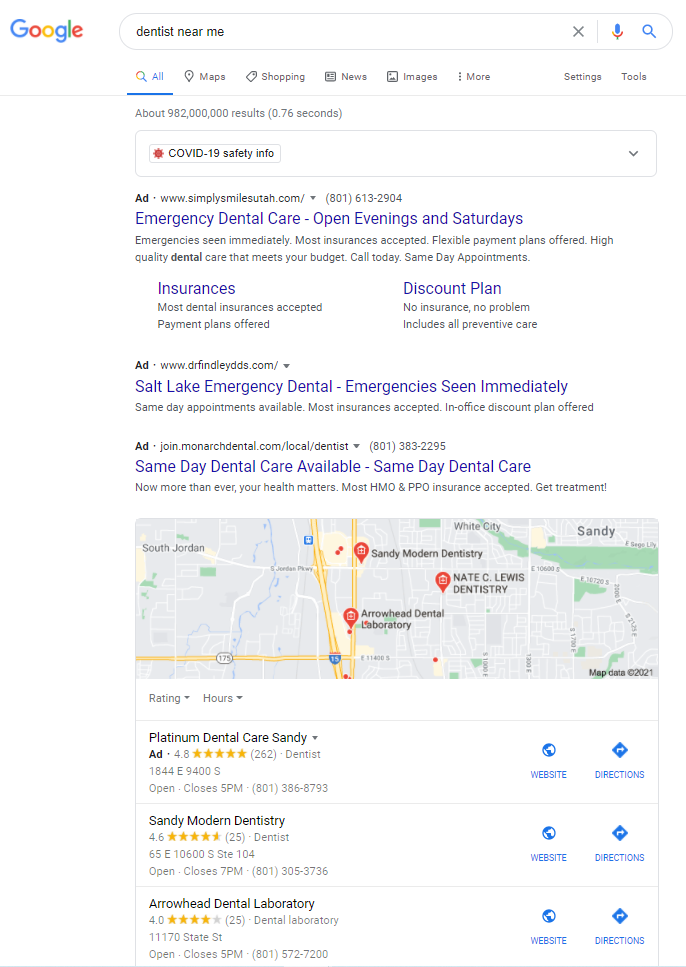
More traffic often leads to better rankings, so getting PPC ads can not only get you more patients, it can also help your organic SEO efforts, too.
Make sure to invest in call tracking so you can better track the effectiveness of your ads. Plus, you can get recordings of phone calls to look back at how successful your office managers are at scheduling appointments. And, take the questions people ask your office managers about and write blogs about it!
6. Invest in Other Marketing Channels
SEO is more than your website, it’s also building a strong reputation. Think of it this way: do the people in your community know the name of your practice? If they’re more likely to search your name specifically, you can rank higher. But how do you get the name of your practice out there?
A lot of SEO is making sure people can find your content, but the other side is to bring your content to people. To build a successful SEO strategy, you have to build your brand name through channels not just on your website.
Consider investing in radio ads, postcards, becoming a sponsor at a local event, or even get a billboard to make it more likely for someone to search your practice’s name directly, not just “dentist near me.”
You should also be regularly posting and promoting your content on social media, such as Facebook or Instagram. Build your reputation online and offline to get better SEO results.
Read More: Top 14 Dental Marketing Ideas To Get New Patients
Do You Need Help Building Your SEO Strategy?
If you aren’t getting found online, invest in a good digital marketing agency to help you build an optimized website that can help you rank on Google. We have options to help you take control of your marketing online, whether you want to do it yourself or leave it to the experts.
Check out all of our dental marketing packages so you can start growing your practice’s presence online through blogging, optimizing your GMB profile, and more!
Need a little insight before getting started? Get a free analysis from us today to learn more about what you can do now to grow your practice on Google.
